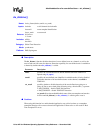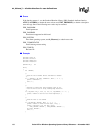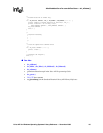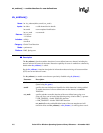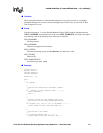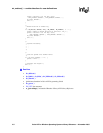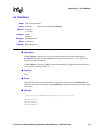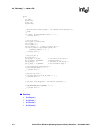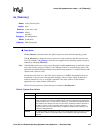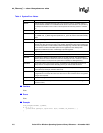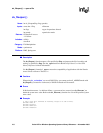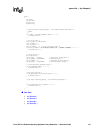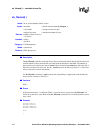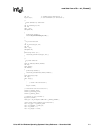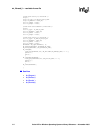
Voice API for Windows Operating Systems Library Reference — November 2003 205
return the system error value — dx_fileerrno( )
dx_fileerrno( )
return the system error value
!
!!
! Description
The dx_fileerrno( ) function returns the global system error value from the operating system.
Call dx_fileerrno( ) to obtain the correct system error value, which provides the reason for the
error. For example, if dx_fileopen( ) fails, the error supplied by the operating system can only be
obtained by calling dx_fileerrno( ).
Note: Unpredictable results can occur if you use the global variable errno directly to obtain the system
error value. Earlier versions of Visual C++ use different Visual C++ runtime library names. The
application and Intel® Dialogic® libraries may then be using separate C++ runtime libraries with
separate errno values for each.
See the Microsoft Visual C++ Run-Time Library Reference or MSDN documentation for more
information on system error values and their meanings. All error values, which are defined as
manifest constants in errno.h, are UNIX-compatible. The values valid for 32-bit Windows
applications are a subset of these UNIX values.
Table 4 lists the system error values that may be returned by dx_fileerrno( ).
Name: int dx_fileerrno(void)
Inputs: none
Returns: system error value
Includes: srllib.h
dxxxlib.h
Category: File Manipulation
Mode: synchronous
Platform: DM3, Springware
Table 4. System Error Values
Value Description
E2BIG Argument list too long.
EACCES Permission denied; indicates a locking or sharing violation. The file’s permission setting or
sharing mode does not allow the specified access. This error signifies that an attempt was
made to access a file (or, in some cases, a directory) in a way that is incompatible with the
file’s attributes. For example, the error can occur when an attempt is made to read from a
file that is not open, to open an existing read-only file for writing, or to open a directory
instead of a file. The error can also occur in an attempt to rename a file or directory or to
remove an existing directory.
EAGAIN No more processes. An attempt to create a new process failed because there are no more
process slots, or there is not enough memory, or the maximum nesting level has been
reached.



